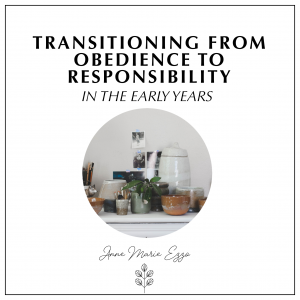Part Two: The Early Years
moving your child from obedience to responsibility
The Middle Years transition (8-12 years) is probably one of the most difficult transitions parents have to make. You’ve worked diligently to appropriately use your authority as a parent to instruct your child about the importance of following instructions, exercising self-control, and other life skills and virtues. Finally, just as everyone is comfortable, it’s time for the next phase of parenting to begin: using your relational influence, rather than your authority, to encourage and provoke your child to love and good works. While a “Yes, Mom/Dad” is still important, now it should be coming from the heart that understands why the parents have asked for a verbal response. Making sure a child understands the ‘why’ behind instructions will help the 8-year-old as well as the teen accept responsibility for their own ‘monkeys’. (For more on the ‘monkey’ teaching, see this resource.)
Let’s review what parenting looks like in the early years. For health and safety reasons, parents begin training in obedience. At first, you will receive compliance. As your child grows in understanding of what is expected of him, compliance moves to obedience. The motivation to obey in the beginning is the avoidance of negative consequences – your child discovers that doing what Mommy or Daddy asks has more pleasant consequences than not doing what he is told.
Somewhere in those early years you will also read to your children about God and share the Bible verse “Children, obey your parents”. (Col. 3:20) This verse adds more meaning to the word “obey” and the phrase “Yes, Mommy”. Your child will learn that God is important. He or she will realize: our friends talk about God, we fold our hands and close our eyes and talk to God, and He is very important to my parents. At some point your little one will start to ask questions about God. Some may express their opinion that obedience isn’t their favorite thing to do. This is a prime opportunity to ask them questions about who they think God is and why He wants us to obey. Also, parents can explain that even mommies and daddies obey God, because we have learned that God loves us so much. Parents can give a simple gospel message to your child. “What Mommy has learned is that I obey or submit to God because I love Him so much and know that He wants to protect me from hurting myself.” You can ask your 4- or 5-year-old, “Why do Mommy & Daddy want you to play in the backyard, staying away from the street?” A child should be able to answer a bit more than “because if I don’t, I’ll get a consequence”. If that’s what he does say, you can agree but add “Because we want to protect you from any cars that might be on the road from hurting you and that you might not see. So when you obey our instructions to stay out of the road, you are protected from being hurt by a car.” Or use whatever illustration your child will relate to. All this is building ‘line upon line’, providing the ‘why’ we do what we do.
If only training your child to be responsible stayed simple like staying out to the road! But it doesn’t. All of this early training, however, is laying the foundation for building your relational influence. Your child will have a pool of experiences to draw from as he moves into the middle years and beyond.
As your child learns to accept the boundaries of the backyard and then the driveway with his little bike, you will eventually allow him the freedom to ride on the road with you while you walk alongside. It’s important that when you open the funnel to allow these privileges/freedoms, you share the ‘why’ with your child. (for more on the funnel, see this resource.) You can even phrase the provision of the freedom in a question format to see if your child is actually grasping the progression of restraint to freedom. For example, “Mommy is going to give you the freedom to ride your bike while I push the baby in the stroller. Do you know why I can allow you to do this?” Depending on his answer, you can affirm, “Yes, because you have demonstrated responsibility in being careful about staying in the yard/driveway while you are playing outside, so now you can have the freedom to use your bike on the road when you are with Mommy.” You might even follow up with, “Do you think you can take your bike on the road if Mommy is not with you?” Again, whatever the answer, you can take it from there, continuing to reinforce the concept that with responsibility comes freedom.
A word of caution here, be careful not to take back those responsibility ‘monkeys’ once they’ve been passed on. If you are feeling frustrated and/or are reminding your children constantly, ask the Lord to show you if you are inadvertently picking up monkeys because you are concerned your son or daughter will not remember or won’t do the right thing. If necessary, go back and review the Monkey Teaching.
In part three of this blog, we’ll look at the transition from authority to influence during the preteen and teen years.
Anne Marie Ezzo serves with her husband in ministering to families around the world through Growing Families International. For the past 30+ years her passion has been, and continues to be, to encourage wives and moms to practically understand what it means to “love your husband and children”.






Leave a Reply